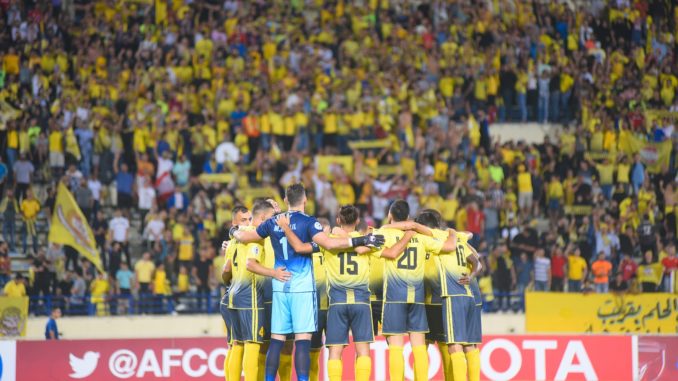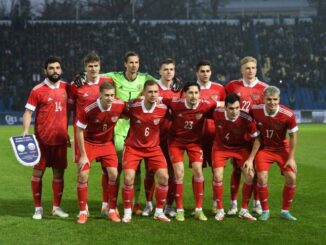
“A Hezbollah team,” Israel’s Prime Minister Benjamin Netanyahu said in his UN speech, referring to Hezbollah’s missile facilities that were allegedly hidden at a football stadium in Beirut.
The stadium is known as Al-Ahed Stadium, and is home to the current Lebanese champions Al-Ahed.
Netanyahu did not invent this nickname out of nowhere. The Western media is very fond of defining Al-Ahed as a “Hezbollah club,” mainly because of the dominant yellow colour of the team’s uniform, and speeches made by Hassan Nasrallah, the Secretary General of the organisation, after winning the recent championships.
Truth is, to date, no explicit documents have been found showing a direct transfer of funds from the organisation to the club, but over the years some Hezbollah officials – from the education and culture departments – have held senior managerial positions at Al-Ahed.
In addition, between the end of the decade and the beginning of the current year, Al-Ahed’s sponsor was the Hezbollah-owned Al-Manar television station.
In 2016, former player Qassem Samaheh, at the time one of the club’s most outstanding youth prospects, was killed. At the age of 19, Samaheh decided to join the organisation as a fighter, and was killed in a battle in Aleppo, Syria.
The team’s fan base is indeed Shiite, but they are not particularly large in number.
There were barely 2,000 spectators at last year’s championship-deciding game. Al-Ahed have had to get creative to attract fans to games. In the 2015/16 season, the club placed a sign outside the stadium inviting the general public to enter the game to receive a free falafel dish.
Al-Ahed’s connection to Hezbollah tells the story of Lebanese football in general.
Al-Ahed was founded in 1964 in the southern suburbs of Beirut, Dahieh, where the team played.
However, following the wars and the situation on the ground, the team was forced to move to a new stadium, the same one mentioned in the Netanyahu speech. The pitch is located near Rafiq Hariri Airport.
By the way, the Lebanese FA has denied Netnayahu’s claims, referring to the stadium as a missile cluster.
Like Al-Ahed, every population group or sector in Beirut – and in Lebanon in general – has a football club. Out of the 12 teams in the top division, six come from the capital.
This creates a high number of derby games. In fact, every cycle in the Lebanese league has at least one massive rivalry.
It is not surprising, then, that Al-Ahed’s major rivalries are Ansar – the grand club of the 1990s, and the one that is identified to this day with the Hariri family, representing the Lebanese patriotic-secular-nationalist stream – and Nejmeh – a huge club and the most popular team in Lebanon.
The fans of Nejmeh emphasise their “All-Lebanese” identity – they do not see themselves as Arabs but more as Lebanese – and the fans are diverse, composed of Sunnis, Druze, Shiites, Christians and even Armenian Catholics.

Two years ago, Nejmeh refused to play a game against Al-Ahed, which the association wanted to switch to a neutral venue and play behind closed doors, claiming that, “Hezbollah is again taking care of the title of Al-Ahed.”
As a result, Al-Ahed was awarded a 3-0 win, and won the championship by three points.
The tension between the various groups and sectors in Lebanon has led to many games being played behind closed doors and has had a fatal impact on the level of professional football in Lebanon.
Despite all this, the league has played without any interruptions for three years in a row.
Al-Ahed is now the leading club in Lebanon. It has six championships, three of them in the last four seasons. They have some of the most prominent Lebanese players, including Rabia Ataya and Mohammed Haidar.
They now stand on the verge of becoming the first Lebanese side to win the AFC Cup.
Twice before have Lebanese clubs made the final of the AFC Cup – Nejmeh in 2005 and Safa in 2008 – but never has a side managed to lift the trophy.
After easing their way through Group C undefeated, with four wins and two draws, they overcame Jordanian powerhouse Al-Wehdat 1-0 in a tight West Asian zone semi final.
Another Jordanian side, Al Jazeera, stood between them and the final and after a 0-0 draw in Amman, a goal from Ahmed Akaïchi in the second leg in Beirut, in front of 10,000 fans, saw Al-Ahed through to their first ever continental final.
That final, against North Korea’s 4.25 SC, will take place in Kuala Lumpur on Monday after initially being moved from Pyongyang to Shanghai.
*A version of this story was originally published on Babagol in October 2018.
Photos: Al Ahed Facebook




